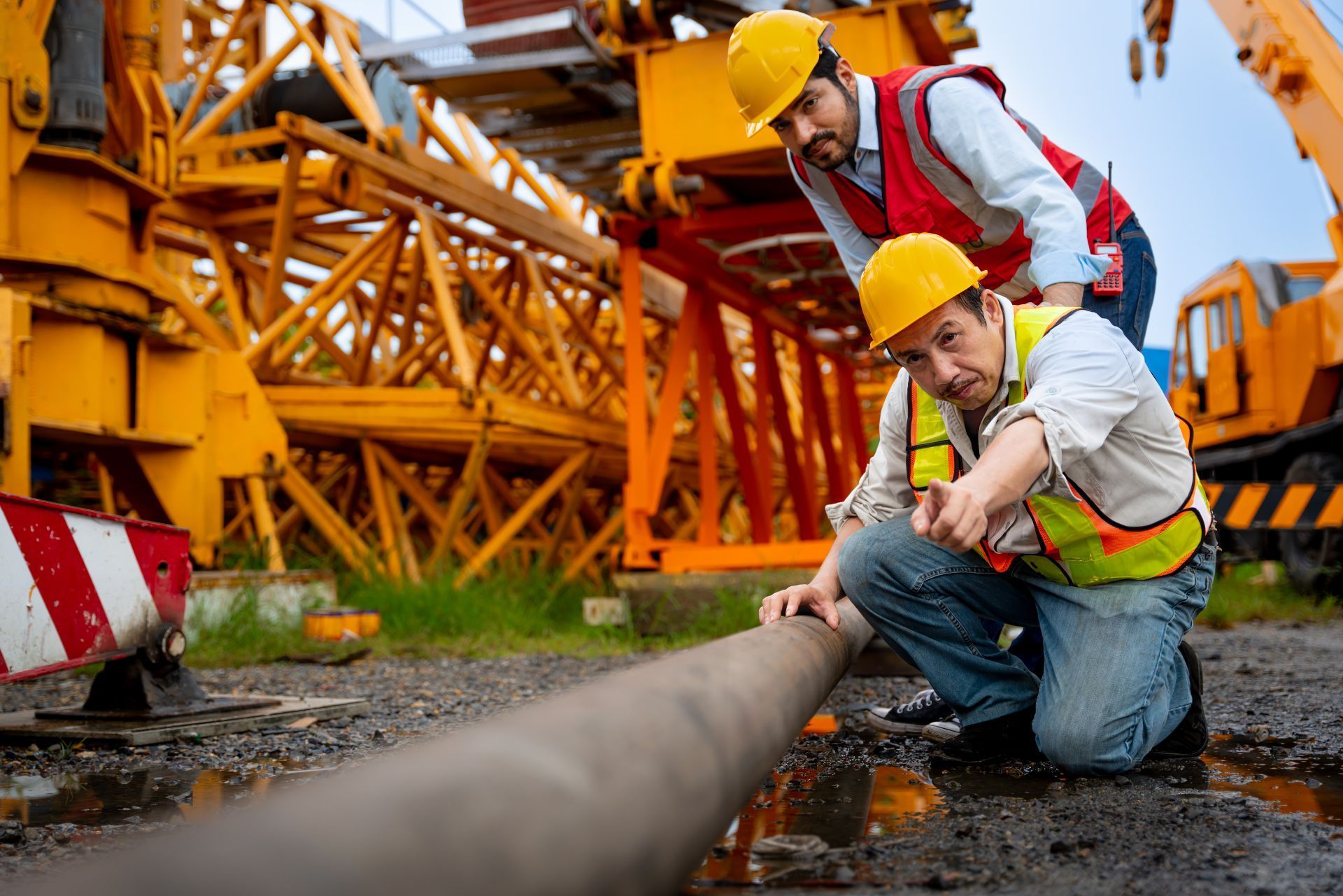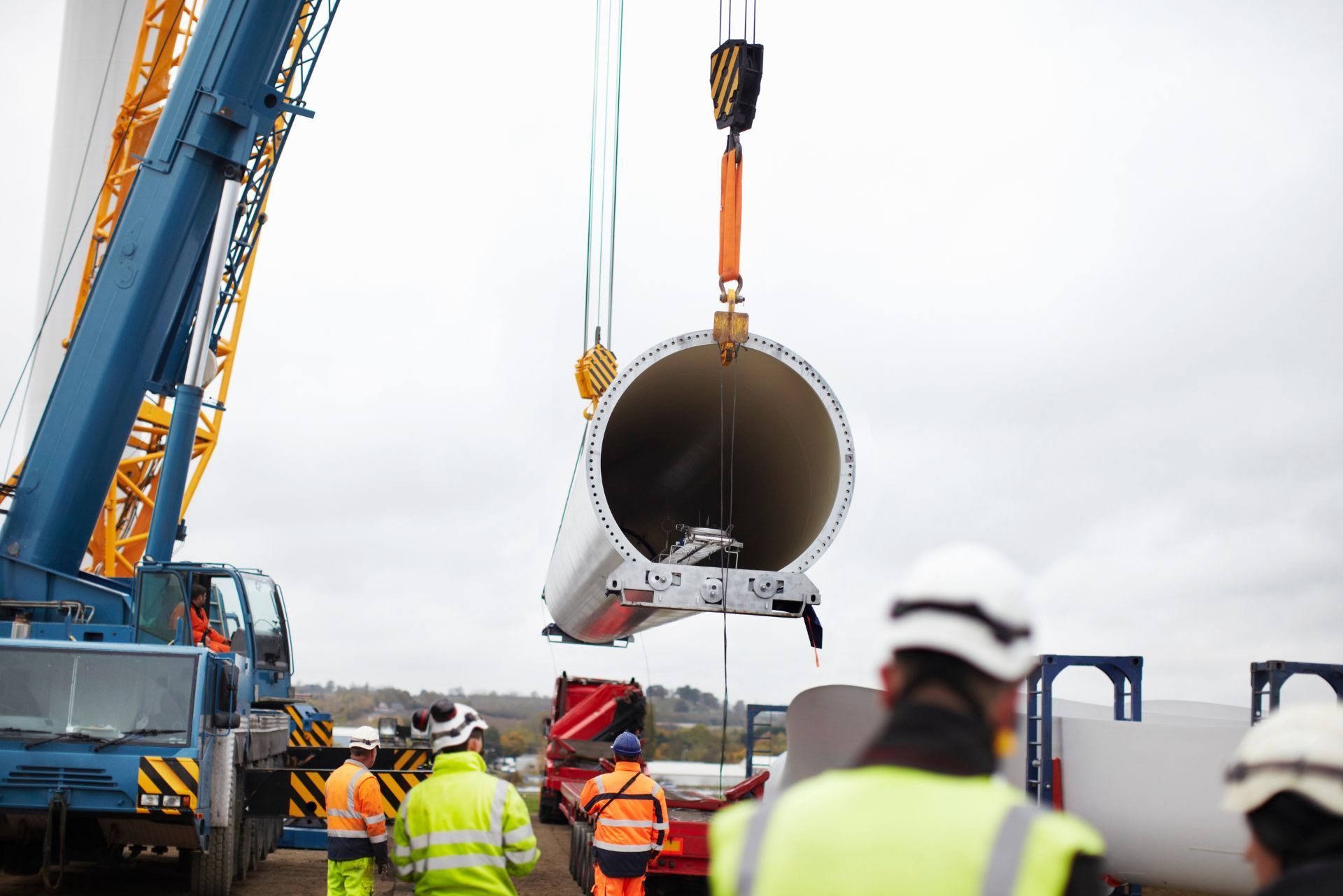Top 3 Recommended Policies

Pipeline construction is a dynamic and rapidly evolving sector within the broader construction industry. With the global pipeline construction market projected to grow from $44.7 billion in 2025 to $69 billion by 2033, businesses in this field face unique challenges and opportunities that require specialized insurance coverage. Understanding the nuances of pipeline construction business insurance is essential for safeguarding assets, managing risks, and ensuring long-term success.
As the industry embraces technological advancements and modular construction methods, insurance providers are adapting to cover new risks, including environmental concerns and cyber threats. This article explores everything you need to know about pipeline construction business insurance, from market trends and risk factors to coverage options and emerging challenges.
Understanding the Pipeline Construction Market Landscape
The pipeline construction market is experiencing robust growth, driven by increasing demand for energy infrastructure and the adoption of innovative construction techniques. Forecasts indicate a compound annual growth rate (CAGR) of approximately 5.59% between 2025 and 2033, reflecting steady expansion and investment in this sector.
One notable trend is the shift towards modular and prefabricated pipeline solutions. These methods offer significant advantages, such as faster project completion, cost savings, and improved quality control. Modular construction reduces on-site labor and minimizes exposure to hazards, which can positively influence insurance risk assessments and premiums.
However, despite these efficiencies, pipeline construction remains a high-risk industry due to the scale of projects, environmental impact, and potential for natural disasters. Businesses must carefully evaluate their insurance needs to address these complexities and protect against unforeseen liabilities. For more insights on market trends, see the Pipeline Construction Industry Report 2025.
Additionally, the integration of advanced technologies such as artificial intelligence (AI) and machine learning is transforming the pipeline construction landscape. These technologies enhance project management through predictive analytics, allowing companies to anticipate potential delays and optimize resource allocation. By leveraging data-driven insights, firms can increase operational efficiency and reduce costs, further solidifying their competitive edge in a rapidly evolving market.
Moreover, sustainability has become a critical focus within the pipeline construction sector. Companies are increasingly adopting environmentally friendly practices, such as using eco-friendly materials and implementing strategies to minimize carbon footprints. Regulatory pressures and public scrutiny regarding environmental impacts are compelling firms to innovate and prioritize sustainable practices, which not only help in compliance but also improve their reputation among stakeholders and consumers alike.

Key Risks in Pipeline Construction and Their Insurance Implications
Environmental and Natural Catastrophe Risks
Environmental risks are a growing concern in pipeline construction. Issues such as excessive siltation, stormwater runoff, and soil contamination can lead to substantial pollution claims. These environmental liabilities not only affect project timelines but also expose companies to costly regulatory fines and remediation expenses. The intricate nature of ecosystems surrounding pipeline routes means that even minor disturbances can have cascading effects, prompting environmental groups and local communities to raise alarms, which can further complicate project execution.
Moreover, natural catastrophes continue to have a significant impact on the construction insurance market. In 2023, insured losses from natural disasters worldwide reached an estimated $123 billion, marking the fourth consecutive year with losses exceeding $100 billion. Pipeline projects, often spanning vast and varied terrains, are particularly vulnerable to storms, floods, and earthquakes, which can cause severe damage and operational disruptions. The unpredictability of climate change adds another layer of complexity, as extreme weather events become more frequent and intense, necessitating a reevaluation of risk assessments and insurance models.
Insurance policies for pipeline construction must therefore include robust environmental liability coverage and natural disaster protection to mitigate these risks effectively. Understanding the scope of these risks helps businesses negotiate better terms and avoid gaps in coverage. Additionally, companies are increasingly investing in preventive measures, such as enhanced monitoring systems and sustainable construction practices, to minimize their environmental footprint and reduce potential liabilities. Additional details on environmental risks in construction insurance are available at Willis Towers Watson's insights.
Technological and Cybersecurity Risks
Technological advancements such as horizontal directional drilling (HDD) and automated monitoring systems have revolutionized pipeline construction by enhancing efficiency and safety. However, these innovations also introduce new vulnerabilities, particularly in cybersecurity. As the industry embraces digital transformation, the integration of advanced technologies, including artificial intelligence and machine learning, becomes essential for predictive maintenance and operational optimization. Yet, this increased reliance on technology also amplifies the risk of cyber threats, as hackers continuously evolve their tactics to exploit system weaknesses.
The adoption of cyber insurance within the construction sector rose by 26% in 2025, reflecting heightened awareness of threats like ransomware and supply chain breaches. Pipeline construction companies increasingly rely on digital tools and IoT devices to monitor operations, making them attractive targets for cyberattacks that can halt projects or compromise sensitive data. The potential fallout from a successful cyber intrusion can be severe, resulting in not only financial losses but also reputational damage that can take years to recover from. Therefore, businesses must prioritize cybersecurity training for employees and implement stringent protocols to safeguard their digital infrastructure.
Incorporating cyber insurance into a comprehensive risk management strategy is becoming indispensable. It covers potential losses from data breaches, system outages, and cyber extortion, helping businesses recover swiftly and maintain operational continuity. Furthermore, as regulatory frameworks around data protection tighten globally, having robust cyber insurance can also ensure compliance and provide peace of mind. For a deeper understanding of this trend, visit
construction insurance industry statistics.
Essential Insurance Coverage for Pipeline Construction Businesses
Pipeline construction companies require a tailored insurance portfolio that addresses the multifaceted risks they face. Below are the primary types of coverage essential for protecting these businesses:
General Liability Insurance
This foundational coverage protects against third-party claims of bodily injury or property damage arising from construction activities. Given the scale of pipeline projects and the involvement of multiple subcontractors, general liability insurance is critical for managing everyday operational risks. It not only covers legal costs associated with claims but also provides a safety net that allows businesses to focus on their core operations without the constant worry of potential lawsuits. Additionally, many clients and partners may require proof of general liability coverage before entering contracts, making it a vital component of any pipeline construction business's insurance strategy.
Builder’s Risk Insurance
Builder’s risk insurance covers physical damage to the pipeline under construction, including losses from fire, theft, vandalism, and certain natural disasters. Since pipeline projects often extend over large geographic areas, this coverage ensures that unexpected events do not derail progress or cause financial hardship. This type of insurance is particularly important in regions prone to extreme weather conditions, where the risk of damage is heightened. Moreover, builder’s risk insurance can also cover materials and equipment that are on-site, providing comprehensive protection that allows contractors to proceed with confidence in their project timelines.
Environmental Liability Insurance
Due to the environmental sensitivities associated with pipeline installation, environmental liability insurance is vital. It covers costs related to pollution cleanup, legal defense, and regulatory fines resulting from accidental releases or contamination during construction. With increasing scrutiny from regulatory bodies and the public regarding environmental impact, having this coverage not only protects the company financially but also enhances its reputation as a responsible operator. Additionally, many projects may require environmental assessments and compliance measures, making this insurance an integral part of the planning and execution phases of pipeline construction.
Professional Liability Insurance
Errors and omissions in design, engineering, or project management can lead to costly claims. Professional liability insurance protects against such claims, providing financial security for technical professionals involved in pipeline projects. This coverage is particularly crucial for engineering firms and consultants who play a pivotal role in the planning and execution of pipeline installations. As the complexity of projects increases, so does the potential for miscalculations or oversights, making professional liability insurance a necessary safeguard against the financial repercussions of such errors.
Cyber Insurance
As mentioned earlier, cyber insurance is increasingly important in pipeline construction. It safeguards against losses from cyber incidents, including ransomware attacks and data breaches, which can disrupt operations and damage reputations. The integration of technology in pipeline monitoring and management has made these businesses more vulnerable to cyber threats. With sensitive data and operational systems at risk, having robust cyber insurance can help mitigate the financial impact of a breach, covering costs related to recovery, legal fees, and even public relations efforts to restore trust with stakeholders.
Equipment and Machinery Insurance
Pipeline construction relies heavily on specialized equipment like HDD rigs and automated monitoring devices. Insurance covering damage, theft, or breakdown of this equipment ensures that projects can continue without costly delays. This coverage is essential not only for protecting the investment in high-value machinery but also for maintaining operational efficiency. In an industry where time is often equated with money, having equipment and machinery insurance can mean the difference between meeting project deadlines and incurring significant financial penalties. Furthermore, many insurers offer additional services, such as risk assessments and equipment management advice, which can help businesses optimize their operations and reduce the likelihood of claims.
Leveraging Technology to Reduce Insurance Risks
Technological innovation not only transforms construction methods but also plays a crucial role in risk mitigation. Advanced inspection techniques, such as thermal imaging, have become invaluable tools for pipeline maintenance and safety assurance.
Thermal imaging can detect anomalies in pipelines with an accuracy of 92%, identifying leaks, corrosion, or structural weaknesses before they escalate into major problems. Early detection reduces the likelihood of costly claims and enhances safety compliance, which insurers view favorably when underwriting policies. This proactive approach not only safeguards physical assets but also fosters a culture of accountability and diligence within organizations, as teams become more aware of the importance of regular inspections and maintenance.
Additionally, automated monitoring systems provide real-time data on pipeline integrity and environmental conditions, enabling proactive risk management. These technologies contribute to lowering insurance premiums by demonstrating a commitment to safety and loss prevention. The integration of Internet of Things (IoT) devices further enhances this capability, allowing for continuous monitoring and immediate alerts in case of any irregularities. Such systems can also analyze historical data to predict potential failures, enabling companies to schedule maintenance before issues arise. For more information on pipeline inspection innovations, see pipeline statistics and technologies.
Moreover, the use of drones equipped with high-resolution cameras and sensors is revolutionizing the way inspections are conducted. These unmanned aerial vehicles can cover vast areas quickly and safely, capturing detailed images and data that would be difficult to obtain through traditional methods. Drones can inspect hard-to-reach locations, reducing the need for scaffolding or other potentially hazardous setups. This not only enhances safety for workers but also minimizes downtime, allowing for more efficient operations. As the technology continues to evolve, the potential for integrating artificial intelligence in analyzing the data collected by drones could lead to even more sophisticated risk assessment strategies, further solidifying the role of technology in the insurance landscape.

Choosing the Right Insurance Partner
Given the complex risk profile of pipeline construction, partnering with an insurance provider experienced in this niche is essential. A knowledgeable insurer can offer customized policies that align with specific project requirements, regulatory standards, and emerging risks. This tailored approach ensures that businesses are not only compliant with local laws but also protected against unique challenges that may arise during the construction process, such as geological issues or unexpected project delays.
Businesses should seek insurers who understand the latest industry trends, including the adoption of modular construction, environmental regulations, and cyber threats. Providers that offer risk management consulting and loss prevention services add significant value beyond traditional coverage. For instance, insurers that incorporate advanced data analytics can help identify potential risks before they escalate, allowing companies to implement preventive measures proactively. This forward-thinking approach not only mitigates risks but can also lead to cost savings in the long run.
Regularly reviewing and updating insurance policies is also critical as projects evolve and new risks emerge. Staying informed about market developments, such as the overall growth of the global construction insurance market projected to reach $18.9 billion by 2025, helps businesses maintain adequate protection and competitive advantage. More details on market size and growth can be found at construction insurance market statistics. Additionally, engaging in discussions with industry peers and attending relevant conferences can provide valuable insights into best practices and emerging trends, further enhancing a company's ability to navigate the complexities of insurance in pipeline construction.
Moreover, understanding the claims process is vital when selecting an insurance partner. A responsive and efficient claims handling system can significantly impact a business's recovery from a loss. Companies should inquire about the insurer's track record in claims resolution, including average turnaround times and customer satisfaction ratings. This information can be crucial in ensuring that, in the event of an incident, the business can quickly resume operations with minimal disruption. Ultimately, the right insurance partner will not only provide coverage but will also act as a strategic ally in navigating the multifaceted challenges of pipeline construction.
Conclusion
Pipeline construction business insurance is a vital component of risk management in an industry marked by rapid growth, technological innovation, and significant environmental and operational risks. Understanding the unique challenges faced by pipeline construction companies—from environmental liabilities and natural catastrophes to cyber threats and equipment risks—enables businesses to secure comprehensive coverage tailored to their needs.
By leveraging modern technologies like thermal imaging and automated monitoring, companies can reduce risks and demonstrate proactive safety measures that benefit both operations and insurance terms. Selecting the right insurance partner and maintaining up-to-date policies ensures resilience against the uncertainties inherent in pipeline construction projects.
As the pipeline construction market continues its upward trajectory, informed insurance strategies will remain indispensable for protecting investments, safeguarding workers, and supporting sustainable growth.
Contact Us
Phone
Location
9595 Six Pines Dr, Suite 8210, The Woodlands, TX 77380

